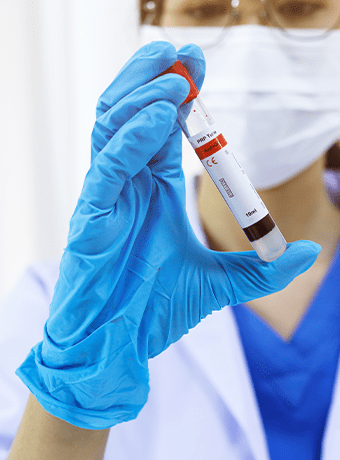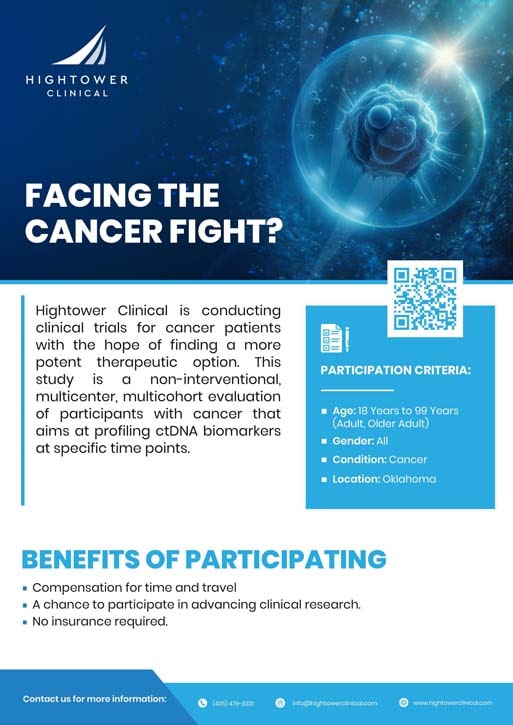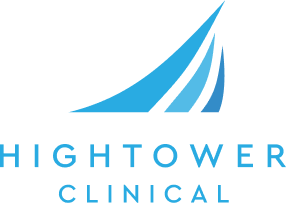The goal of this clinical trial is to better understand how ctDNA can help with early detection and monitoring of patients diagnosed with cancer in Oklahoma City, OK and help in improving personalized treatment strategies.
Safe and Effective Trials for Patients Diagnosed with Cancer in Oklahoma City, OK
Join our trials for patients diagnosed with cancer in Oklahoma City, OK where your participation in the blood samples collection from cancer patients can help advance our understanding of cancer and its potential treatment options.
Enroll Now
Living with Cancer?
Participate in our trials for patients diagnosed with cancer in Oklahoma City, OK.
Cancer characterizes uncontrolled cell growth in various body parts that can also spread to other sites. It affects millions of people yearly. There is a dire need to better understand how cancer works and then ultimately explore effective therapeutic interventions and give hope to those suffering.
Hightower Clinical is conducting research studies for patients diagnosed with cancer in Oklahoma City, OK. This study is a non-interventional, multi-center research involving cancer patients. Participants will have plasma ctDNA biomarker testing at certain times during their regular treatment to help track and understand the disease better.
*Joining the clinical trial is free and entirely your choice.
*Simply fill out the form, and our research team member will reach out to check if you’re eligible for the study.
Cancer Bio Repository
| Study Name | Protocol Number | Sponsor |
|---|---|---|
| Cancer Bio Repository | Tempus |
About Clinical Trials for Cancer Patients
In order to profile longitudinal ctDNA biomarker at specific time points, Hightower Clinical is conducting biorepository clinical trials for patients diagnosed with cancer in Oklahoma City, OK.
This clinical trial is meant for monitoring and diagnosing biomarkers in cancer patients. It is a non-interventional, multicenter, multicohort monitoring of cancer patients. Patients will undergo a detection test from time to time for longitudinal plasma ctDNA biomarker profiling. Parallel to it, they will be given standard care therapy.
This study enrolls participants diagnosed with cancer willing to provide additional blood samples for ctDNA research.
*All study procedures and treatments, including the investigational drug, are provided at no cost, and insurance is not needed to join.
*The study doctor will guide you through each step of the clinical trial, answering any questions you may have about the treatment before you decide to participate.
Cancer Research-What to Expect?
When you agree to enroll in the study, you will be asked to sign an Informed Consent Form (ICF). The ICF delves into the details of the study. Our research team will guide you through the process and explain your role in the trial. We encourage you to ask as many questions as you need before deciding whether to participate or withdraw.
After signing the consent form and addressing your concerns, you will be monitored regularly for biomarker profiling through expert professionals.
This study does not involve any additional treatments. It takes place across multiple centers and includes different groups of cancer patients. The participants will have their blood tested for ctDNA biomarkers at specific time intervals while they continue with their regular cancer treatment.
Study-related care is provided at no cost, and you will be supervised via experienced doctors and healthcare professionals conducting thorough exams and assessments.


Age
18 Years to 99 Years (Adult, Older Adult)
Gender
All
Condition
Cancer
Current Status
Recruiting
What Happens in Cancer?
Cancer represents the condition when abnormal cells begin to multiply uncontrollably, forming tumors or spreading to other body parts. These cells can invade surrounding tissues, disrupting the normal functioning of organs and systems.
Complications:
- Metastasis: Cancer cells can spread to other parts of the body, making it harder to treat.
- Organ Dysfunction: Tumors may interfere with the function of vital organs such as the lungs, liver, or kidneys.
- Pain and Discomfort: Cancer growth can lead to chronic pain in the affected area.
Symptoms:
- Unexplained Weight Loss: Losing weight without trying is a common early symptom in many cancers.
- Fatigue: Constant tiredness that doesn’t improve with rest.
- Pain: Persistent pain, especially in areas like bones or joints, may be a symptom of advanced cancer.
- Changes in Skin: Unexplained changes, such as new growths or sores that don’t heal, can signal skin cancer.
- Bleeding or Discharge: Unusual bleeding or discharge, like blood in stool or urine could be a sign.
Frequently Asked Questions
What are the benefits of participating in this study?
Participating in this study, you can contribute to groundbreaking research that could lead to more effective cancer treatments. Additionally, you may also benefit from personalized insights into your own cancer’s genetic makeup.
How is ctDNA collected and analyzed?
ctDNA is collected through a simple blood test, and then analyzed in a lab to look for genetic markers that can help guide cancer treatment decisions.
Will ctDNA profiling change my current treatment plan?
ctDNA profiling might provide additional insights into your cancer, but any changes to your treatment plan would be discussed with your doctor based on the findings.
Are there any risks associated with participating in this study?
The risks are minimal, mainly related to the blood drawn itself. However, your healthcare team will monitor you closely throughout the study to ensure your safety.




